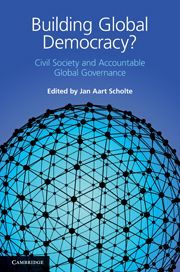Book contents
- Frontmatter
- Contents
- List of figures
- Participants in the Gothenburg Workshop
- List of contributors
- Editor's acknowledgements
- List of abbreviations
- Introduction
- 1 Global governance, accountability and civil society
- 2 Civil society and accountability of the United Nations
- 3 The World Bank and democratic accountability: the role of civil society
- 4 Civil society and IMF accountability
- 5 Civil society and the WTO: contesting accountability
- 6 Civil society and accountability in the Commonwealth
- 7 The Organisation of the Islamic Conference: accountability and civil society
- 8 Civil society and patterns of accountability in the OECD
- 9 Civil society and G8 accountability
- 10 Structuring accountability: civil society and the Asia-Europe Meeting
- 11 Civil society and accountability in the global governance of climate change
- 12 Civil society and accountability promotion in the Global Fund
- 13 Accountability in private global governance: ICANN and civil society
- 14 Civil society and the World Fair Trade Organization: developing responsive accountability
- Conclusion
- Bibliography
- Index
14 - Civil society and the World Fair Trade Organization: developing responsive accountability
Published online by Cambridge University Press: 05 June 2012
- Frontmatter
- Contents
- List of figures
- Participants in the Gothenburg Workshop
- List of contributors
- Editor's acknowledgements
- List of abbreviations
- Introduction
- 1 Global governance, accountability and civil society
- 2 Civil society and accountability of the United Nations
- 3 The World Bank and democratic accountability: the role of civil society
- 4 Civil society and IMF accountability
- 5 Civil society and the WTO: contesting accountability
- 6 Civil society and accountability in the Commonwealth
- 7 The Organisation of the Islamic Conference: accountability and civil society
- 8 Civil society and patterns of accountability in the OECD
- 9 Civil society and G8 accountability
- 10 Structuring accountability: civil society and the Asia-Europe Meeting
- 11 Civil society and accountability in the global governance of climate change
- 12 Civil society and accountability promotion in the Global Fund
- 13 Accountability in private global governance: ICANN and civil society
- 14 Civil society and the World Fair Trade Organization: developing responsive accountability
- Conclusion
- Bibliography
- Index
Summary
Introduction
The studies in this book assess the role of civil society in a variety of global governance arrangements. In respect of the first nine institutions examined in earlier chapters, civil society associations have stood as outside parties who intervene in a state-based global governance apparatus. The next three cases (respectively on climate change, global disease control and Internet regulation) have involved hybrid forms of governance, where some civil society actors work inside the regulatory organisation along with official and/or commercial elements. Now this final case study considers a global governance institution with an entirely non-state character, the World Fair Trade Organization (WFTO). Hence this chapter analyses how one civil society actor (the WFTO) has accountability relations with other civil society associations (for example its member organisations and consumer groups).
The fair trade movement is experiencing extraordinary expansion in the early twenty-first century. Growing public awareness of the need for socially and environmentally responsible products is increasing demand for fair trade goods. As a result these articles are now sold not only through specialised fair trade shops, but also through mainstream retail channels. In 2009, consumers in the European Union purchased €1.5 billion in certified fair trade goods, a level 70 times greater than in 1999. In 2007 fair trade sales worldwide totalled more than €2.3 billion, albeit that this figure comprised less than 1 per cent of overall world trade (Commission of the European Communities 2009: 3).
- Type
- Chapter
- Information
- Building Global Democracy?Civil Society and Accountable Global Governance, pp. 289 - 305Publisher: Cambridge University PressPrint publication year: 2011
- 4
- Cited by



